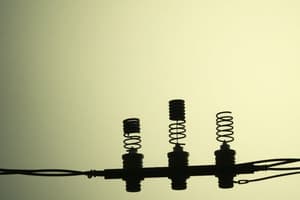Podcast
Questions and Answers
What is the primary carrier of electric current in solids?
What is the primary carrier of electric current in solids?
- Neutrons
- Ions
- Free electrons (correct)
- Protons
What characterizes an insulator in terms of current flow?
What characterizes an insulator in terms of current flow?
- Presence of free electrons
- High valence electrons availability
- High conductivity
- No free electrons (correct)
How is electric current defined?
How is electric current defined?
- The amount of current flowing through a circuit at any moment
- The total voltage across a conductor
- The rate of flow of charge across a cross-section (correct)
- The displacement of atoms in a conductor
What does the symbol 'I' represent in the context of electric current?
What does the symbol 'I' represent in the context of electric current?
Which of the following statements about gases as current carriers is true?
Which of the following statements about gases as current carriers is true?
Flashcards
Electric Current Definition
Electric Current Definition
The rate of charge flow through a conductor.
Current Carriers (Solids)
Current Carriers (Solids)
Free electrons or valence electrons in a solid material.
Current Carriers (Insulators)
Current Carriers (Insulators)
No free or valence electrons.
Current Symbol
Current Symbol
Signup and view all the flashcards
Current Calculations
Current Calculations
Signup and view all the flashcards
Study Notes
Electric Current
- Electric current is the rate of flow of charge.
- Current carriers are the particles that carry the charge.
- In solids, they are free electrons.
- In liquids and gases they can be ions.
- Current is measured in Amperes (A).
- The rate of flow of charge through a cross-section of a conductor per unit time is electric current.
- The unit of electric current is ampere (A).
- 1 A = 1 Coulomb/second
- Current is the rate of flow of charge through a given cross-section area.
- Current is denoted by 'I'.
- The formula for calculating current is I = Q/t, where Q is the amount of charge that flows and t is the time taken.
- Electric current is a scalar quantity.
Types of Conductors/Insulators
- Conductors allow current to flow easily.
- Insulators resist current flow.
- Examples of conductors are metals (like copper and silver).
- Examples of insulators are rubber and glass.
Studying That Suits You
Use AI to generate personalized quizzes and flashcards to suit your learning preferences.




